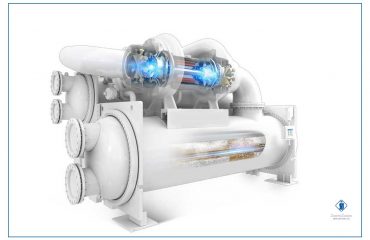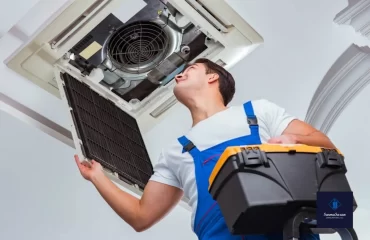In places like hospitals and laboratories, having a proper air purification system is usually considered a basic need. This need is important not only to maintain a constant temperature for the comfort of patients or to maintain the health of laboratory products but also to have healthy air, free from crime and pollution. It is in this state that the used and polluted air leaves the environment and fresh air enters it so that this cycle is constantly repeated.
Why should air be purified ?!
Healthy and clean air is a priority to keep pollution and diseases away from sick people and even healthy people in such places. But this need is felt in other places as well. For example, warehouses for food, health care or cosmetics need an air purification system to keep products healthy. Either residential areas established in dangerous areas, or the homes of people with respiratory problems who have to live in a safer area to stay away from the disease or not get worse, but have no choice but to stay in the same place and seek help from They do not have air conditioning and air purification systems.
Also, indoor appliances such as plastic appliances, textiles, wooden tools, as well as indoor processes such as cooking and breathing of multiple people, increase the number of particulate matter and microorganisms and increase the need for home air purification. Makes it more prominent. This means that healthy people without respiratory problems also need air purification and breathing fresh and clean air. In any case, when the need for an air purification system is determined, the preparation stage arises, and in order to prepare a purification system, it is necessary to measure the needs of the house with the products available in the market.
So depending on where you live and your personal circumstances, you may be wondering what is bothering you and what you need. Do you live in an industrial town with chemical pollutants or do you have a respiratory disease or is your city polluted by soil and sand in the air?

What factors influence the choice of home air purification systems?
Purification system capacity
One of the main factors in choosing a home air purification system is the capacity of the system. That is, how much load does the system face and should it have limited capacity or be able to handle heavy operation?
There is no need to spend too much on a purification system if you do not really feel the need for it. That is why the first step in purchasing and installing a purification system should be a professional evaluation before purchasing and installing it. In this evaluation, the required capacity is considered.
Usually, every 45 to 55 square meters need a cooling capacity of 1 ton. However, several factors affect this general rule. For example, the weather conditions of the area where the house is located, the thickness of the walls, the ceiling and the number of doors and windows. For example, regardless of the physics of the house, if you live in the south of an area, you naturally need a high cooling capacity for your appliances.
Therefore, an expert determines the appropriate capacity based on the specific conditions of each house. These conditions are as follows:
- House area and its layout: means the space available for the passage of air through open paths
- Geographical point: For example, the humidity and type of pollution in each city is a subset of criteria related to the geographical point. In one city, pollution can be reduced to fine particles, and in another city, there is coarse dust in the city air, and in another city, the pollution is chemical gases of industrial origin. For this reason, the type of filter and its capacity and purification capacity must be localized depending on each location in order to meet the type of need.
- Presence or absence of direct sunlight
- Number of doors and windows
- Ceiling height of the house
- Quality of home insulation
- Leakage and air leakage
Unfortunately, most contractors in this area do not spend enough time to weigh these points, and just to ensure that the minimum is observed and the security of the home system is not compromised, they offer a system with a higher capacity than required to Residents of the building will incur much higher costs – both in the purchase and in installation and commissioning.
The important point here is that you should never trust a contractor who does not refer to the manuals and only relies on their own experiences. It is almost impossible for a person to walk into a house to realize the capacity required for the ventilation system. This only indicates that the person is unprofessional and increases the likelihood of system failure.
System power
Another factor is the strength of the system. The higher the suction power, the sooner a room with a fixed area will be emptied and treated than a system with less suction power.
the budget
The next factor in choosing an air purification system is the cost and budget allocated to it. When it comes to cost, it will be very easy to calculate. Because larger devices are more expensive and will cost more. The larger the house, the higher the capacity required for purification, and the larger the size of the device. In addition, the cost of installation and maintenance of this system will increase as the area, capacity and dimensions increase.
Type of air purification system based on filter
The next criterion is the type of purification system itself. There are different types of filters for air purifiers that differentiate the devices from each other. There are two types of filters: active or active and passive or inactive.
Active filters purify ions with the help of ionization and chemical properties. Passive purification systems also leave the main task of sucking and passing air through the filters. In this case, the filters play the main role and you can choose the appropriate type depending on your needs and the characteristics of each filter.
Depending on the size of the contaminants and dust particles, different filters can meet the treatment needs. For example, plant dust, mold, and fungus are larger than 0.3 microns, but the virus is smaller and requires a stronger filter such as an active filter or radiation.
Maintenance and repair conditions
The next criterion is the facilities and space available for the maintenance of the systems. These maintenances can include replacing worn-out parts, cleaning or replacing air filters, proper insulation, and updating and reinforcing old parts with newer technology parts.
In the continuation of this issue, we can pay attention to the warranty and after-sales service. Imported home air purification systems can not meet the need for warranty and after-sales service in Iran. In this case, replacing each component can lead to its own challenges. In contrast, in-house production systems have the potential to make parts in their original form available to consumers again.
In addition, an after-sales service is an auxiliary option for a complex treatment system. Especially since the home air purification system is faced by non-specialists who need systems that are easy to use and hassle-free. In these circumstances, the choice of internal systems would probably be a more logical choice.
It should not be forgotten that proper insulation will affect the overall performance of purification and ventilation systems. Poor insulation will have a direct impact on the short-term and long-term costs of the system. First of all, since a lot of air is wasted and exhausted, you will need a stronger and larger system to compensate for this waste, which in itself will be expensive. The next thing is that you are actually wasting money to make the device work more so that you can balance the performance of the device with your needs. The damage caused by this issue will be significant after many years.
Technical criteria and calculation of the performance of the device or air purification system
Among these, the criteria for calculating the performance of the air purifier, which refers to the technical performance of the purification system, also include the following:
- Clean Air Delivery Rate (CADR), which is the unit of cubic feet per minute. Another way to measure it is the total amount of purified air in one hour.
- Number of air changes per hour or Air Changes Per Hour- ACH
- The amount of noise produced and noise pollution. In a high-quality system, the sound produced at medium speeds is difficult to hear.
- Space covered by the system
- Purifier warranty

 English
English  فارسی
فارسی 



